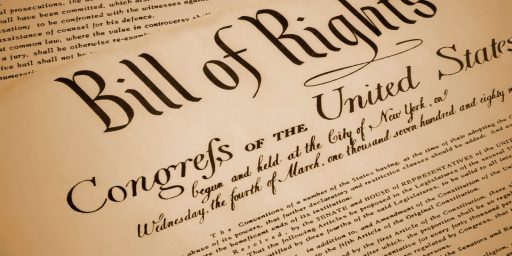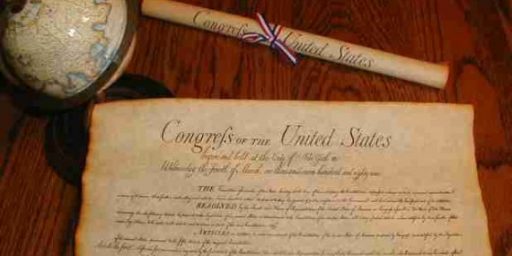Miranda Rights Rewrite Under SCOTUS Review
 The Supreme Court is considering making the Miranda warning more explicit.
The Supreme Court is considering making the Miranda warning more explicit.
The Supreme Court on Monday seemed headed toward telling police they must explicitly advise criminal suspects that their lawyer can be present during any interrogation.
The arguments in front of the justices were the latest over how explicit the Miranda warning rights have to be, as justices debated whether the warnings police gave Kevin Dwayne Powell made clear to him that he could have a lawyer present while being interrogated by police. Powell was convicted of illegally possessing a firearm after telling police he bought the weapon “off the street” for $150 for his protection. Before his confession, Powell signed a Miranda statement that included the statements “You have the right to talk to a lawyer before answering any of our questions. If you cannot afford to hire a lawyer, one will be appointed for you without cost and before any questioning. You have the right to use any of these rights at any time you want during this interview.”
The Florida Supreme Court overturned the conviction on grounds the Tampa police didn’t adequately convey to Powell that he was allowed to have a lawyer with him during questioning. Joseph W. Jacquot, Florida deputy attorney general, argued that the warning given Powell “expresses all the rights required under Miranda.”
Justice Stephen Breyer clearly disagreed. “Aren’t you supposed to tell this person, that unlike a grand jury, you have a right to have the lawyer with you during interrogation?” Breyer said. “I mean, it isn’t as if that was said in passing in Miranda. They wrote eight paragraphs about it. And I just wonder, where does it say in this warning, you have the right to have the lawyer with you during the interrogation?”
Different courts have came down on different sides on what exactly should be said, Justice Sonia Sotomayor said. “We’ve got a split of circuit courts and state courts on whether this reasonably conveys or not. Shouldn’t that be enough of an ambiguity for us to conclude it can’t reasonably convey, if there’s this many courts holding that it doesn’t?” Justice Sonia Sotomayor said.
Powell’s lawyer, Deborah K. Brueckheimer, said that the warning Powell was given from Tampa, Fla., police gave him the impression that “once questioning starts, that he has no right to consult with a lawyer anymore, and it certainly doesn’t tell him that he has the right to the presence of an attorney with him in an interrogation room, where the coercion takes on a highly new meaning.”
Justice Scalia called Brueckheimer’s argument “angels dancing on the head of a pin.” “You are saying, ‘Oh, if he had only known. Oh, if I knew that I could have an attorney present during the interview, well, that would have been a different kettle of fish and I would never have confessed,'” Scalia said. “I mean, doesn’t that seem to you quite fantastic?”
Miranda rights have been litigated since they first came into being in 1966. The courts require police to tell suspects they have the right to remain silent and the right to have a lawyer represent them, even if they can’t afford one. But those requirements likely will continue to be parsed by lawyers and judges.
For example, Justice Samuel Alito pointed out that most police start off Miranda rights by saying “You have the right to remain silent.” But, Alito said, what happens if someone begins talking to the police and then decides that they want to be silent? “Once you break your silence, there is nothing in there that says you have the right to resume your silence,” Alito said.
“We could write that down. It could be the next case,” Justice Anthony Kennedy said to laughter.
This is the third Miranda case the court has heard this year. The justices heard arguments earlier over whether officers can interrogate a suspect who said he understood his rights but didn’t invoke them, and whether a request for a lawyer during interrogation can expire after a lengthy period of time. Decisions in all three cases are expected next year.
The case argued Monday is Florida v. Powell, 08-1175.
While I fully support reading suspects the Miranda warning — it not only ensures they are aware of their rights but encourages better police work — it was never intended to be a Law School for Dummies crash course. Beyond that, the Miranda rights have been so ingrained in our consciousness through the popular culture that most of us can cite them verbatim off the top of our heads. It’s just absurd that people who are told that they have a right to remain silent and a right to an attorney don’t understand that they have a right to be silent when their attorney isn’t present — much less that we should create an ex post facto requirement that this connection be explicitly stated, thus potentially wiping out hundreds of confessions based on an “error” police could never have been expected to avoid.
Rather than turning the Miranda warnings into a novella, a more profitable avenue for the Court to travel would be to radically reduce the ability of police to lie to suspects in order to coerce them into confession. If, for example, Powell was “given the impression” that he had no right to have his attorney present during interrogation because police told him that, the problem isn’t with his Miranda warnings but with dishonest police.
In terms of the warning itself, it would also be useful to simply have SCOTUS tell us precisely what officers should read rather than having it subject to scrutiny after the fact. While that’s typically not what courts do, the fact of the matter is that Miranda was a classic case of legislating from the bench, inventing rule on the basis that it’s good public policy rather than because it’s Constitutionally specified.





I can’t imagine any person outside of maybe somebody Amish failing to grow to adulthood and not be aware of the miranda warning.
I am also not really sure what you could do with the warning, short of handing somebody a copy of the bill or rights to make the rights more explicit.
James, I’m wondering why you have a picture of Carmen Miranda on this post. The association seems inappropriate and I wonder how many historically challenged Americans will now come to believe that Carmen Miranda was somehow involved in Miranda v Arizona? Maybe you should post something in there that says you couldn’t find a picture of “Ernesto Miranda” fast enough.
If you run your mouse over the picture of Carmen Miranda, you’ll see that James dutifully warned that there is no connection. Whether James should have included more explicit warnings is probably an issue for the SCOTUS.
Well, I certainly wouldn’t rely on TV depictions to understand Miranda. Firstly, it is something they do perfunctorily at arrest. When in fact, you are only required to be informed prior to actual questioning. Secondly, in the interest of moving the story forward, the only people who invoke and get lawyers are evil rich people and crime lords. Everyone else is just trying to explain. Innocent people don’t need a lawyer and have nothing to hide, right? Cops love it when people want to explain, it sounds like…confession.
Even speaking as a liberal, I think there are multiple problems with this idea that make it worse than expanding Miranda warnings. First, bluffing, bullying and lying are indispensable tools of good police work. The most obvious example is undercover work, of course. If there was a flat ban on lying to suspects, then it would be impossible to use undercover officers and maybe even informants. Just as importantly, cops deceive suspects into thinking they know more than they really do all the time – it’s an essential part of the “prisoner’s dilemma” type of interrogation. And it’s commonplace for cops to lie to gang members and the like out on the street in order to shape their behavior – this works sometimes because, let’s face it, criminals are knuckleheads. (If they weren’t, they wouldn’t be criminals.) I doubt that judges would want to abandon these practices wholesale.
Of course, you could cabin these problems by, say, limiting the no-lying rule to situations in which Miranda warnings must be given. Still, there is a huge problem of proof. Every interrogation would be subject to judicial review for what the cops said (and didn’t say!) that might have misled the defendant. The line-drawing questions alone show what a massive burden this would be: What if the cop makes false statements unwittingly? What if the cop tells the truth but it’s plain to the cop that the defendant misunderstands? What if another civilian lies to the defendant, and the cop knows of the lie and that the defendant believes it? Are statements of opinion or emotional appeals misleading? All this and more would have to be litigated.
Besides, if cops couldn’t lie to suspects, then you couldn’t have funny stories like this.
The ten rules for dealing with the police.
Rule 1: Never ever talk to the police without a lawyer. Ever.
Rule 2: See rule number 1.
Rule 3: See rule number 1.
Rule 4: See rule number 1.
Rule 5: See rule number 1.
Rule 6: See rule number 1.
Rule 7: See rule number 1.
Rule 8: See rule number 1.
Rule 9: See rule number 1.
Rule 10: See rule number 1.
Uhhhmmm no. I don’t think the police are obliged to tell the truth prior to arrest. I think post arrest they should be required to tell the truth.
Yes! You’d be surprised how many people confess because of what the police say. They have an eyewittness who places them at the crime scene, they have this, that and the other thing. Then 25 years later DNA testing and whoops, not the guy who confessed. There is a weird pschology at work here, IMO. One that sitting comfortably at your PC you can’t quite get your head around. Its like the Stockholm Syndrome. Hell, that might be exactly. When you are arrested in suspicion of a crime you are essentially abuducted and held against your will. Legally so, but still it could produce the same psychology. In fact, I’d say the “good cop/bad cop” approach may seek to create the psychology purposefully to get co-operation out of the suspect. To the extent that it gets the right result great, to the extent it gets the wrong result (an innocent man imprisoned) thats bad. Real bad in that it undermines faith in the criminal/legal system.
And Mithras…do you really want to further undermine the publics faith in the police by saying, “Hey, its okay lie all you want to suspects. Even the innocent ones.”? Sounds like a bad policy to me.
Won’t address the problem, since most confessions are obtained pre-arrest, when the suspect is simply being detained for questioning.
Thanks for the lecture. I know about false confessions. I’m a lawyer who helps out with the local innocence project, among other things. I don’t think a ban on lying by cops would actually reduce false confessions much. The most important factor is the length of the interrogation and the ability of the cops to wear the suspect down using all kind of emotional appeals. Outright lies are the least of the problem.
Anyway, as I said, I doubt judges would create such a rule and, even if they did, it would be unworkable and easy for the cops to evade. Rules that would be easier to administer and would help decrease the rate of false of confessions would be mandating that all questioning of witnesses and suspects be videotaped (throwing out any confessions where any material part of the questioning is not videoed), mandating how long questioning can continue without a break, and minimizing the use of testimony by jailhouse snitches.
Does the public still have faith in the police? Huh.
Steve V reminds me of a business card I once had from a criminal defense lawyer. On one side was his phone number(s) and on the other side IIRC:
This is legal advise, which I can’t imagine the courts requiring a police to dispense (and frankly could be used by the police to gain trust). But the point is that the rights should be reducible to a card with simple, plain language, or it’s not going to work.
Which again…see rule number 1. I don’t care if the police tell the most convincing lie to me, the only thing they are going to get out of me is name, address, and “I want a lawyer.”
Really, I honestly could not tell given your post.
I agree, but outright lying would seem like a good starting point.
How about this for a compromise, between you and me at least, mandatory videotaping and the police can say whatever they want, but if they lie…well there it is on tape for the defense attorney to run with. As for the rest, I’m with ya.
Yeah, sadly there are.
I actually like the idea of mandatory videotaping with vocal recording. I think it would be a good way protect both the suspect and the police.
I still think the vast majority of people could recite the Miranda warnings-and while TV isn’t a great procedural example, I still struggle to imagine a suspect not having a clue they could keep silent and ask for a lawyer.
Also, I am pretty certain cops do not have to actually give you the miranda warning until they regard you as a suspect-but just when the witness or person of interest turns into the suspect is a pretty vague line. I wonder if in the end part of the revamping of the warning-if the court opts to revamp it will be in just when the cops have to give the warning.